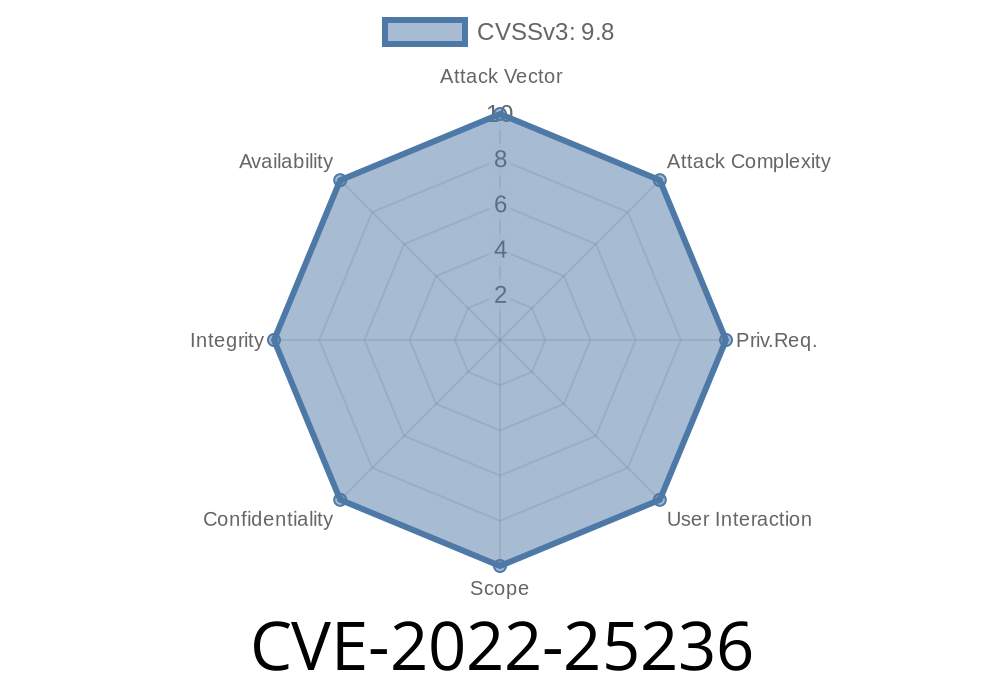CVE-2022-25236 is a notable vulnerability in Expat (also known as libexpat), a widely used XML parsing library found in applications from databases to development tools. The issue resides in xmlparse.c and allows attackers to insert special separator characters into namespace URIs—a vector that can compromise data integrity and potentially lead to application-level attacks.
This article explains the bug in simple terms, gives code samples, references the original sources, and guides you step by step through the exploit scenario.
What Is Expat?
Expat is a popular, open-source XML parser library written in C. It's used in everything from embedded devices to large cloud systems, making this vulnerability potentially far-reaching.
Technical Details
At its core, CVE-2022-25236 is about incorrectly accepting bad characters in namespace URIs during XML parsing. The parser failed to block namespace separator characters that should be considered illegal, due to missing validation in its code.
Namespace URIs in XML help avoid naming collisions, but if an attacker can inject a namespace separator (xFFFE or xFFFF, for example), they may bypass application logic, violate data policies, or even trigger specific malicious behaviors in XML-processing code.
The Code Problem
In affected versions of Expat (< 2.4.5), the root cause is in the handling of namespace URIs in the file xmlparse.c. Before the patch, this function did not properly sanitize or check for forbidden characters.
Here is a simplified excerpt resembling the vulnerable check
// Before fix (simplified)
if (user_uri != NULL) {
// Accepts any character, even forbidden ones
ns_uri = strdup(user_uri);
}
No validation! This means attackers can pass any sequence, including forbidden Unicode characters, as a namespace URI.
From Expat 2.4.5 onward, the code restricts these separators
// After fix (as of 2.4.5)
if (user_uri != NULL && contains_forbidden_chars(user_uri)) {
// Block the request, raise error
return XML_ERROR_INVALID_NAMESPACE;
}
ns_uri = strdup(user_uri);
Imagine an application that uses Expat for XML parsing
char *xml_data =
"<root xmlns:evil='http://example.org/\xFFFE'>";
"<evil:item>Attack!</evil:item>"
"</root>";
XML_Parse(parser, xml_data, strlen(xml_data), XML_TRUE);
On vulnerable Expat (<2.4.5), the parser accepts this.
- If the application relies on namespace URIs for authentication, whitelisting, or any form of data policy, the attacker can evade controls.
Data Manipulation: Trick downstream tools relying on URI conformance.
- DoS or Memory Issues: In poorly written wrappers, acceptance of illegal namespaces may cause undefined behavior.
Let's make a clear PoC in Python using ctypes (assuming you have a vulnerable version of libexpat)
import ctypes
libexpat = ctypes.CDLL("libexpat.so.1") # or path to old expat
# Set up parser, handlers, etc. (details omitted for brevity)
evil_xml = b"""<root xmlns:foo="http://attacker.com/\xfffe"><foo:bar/></root>""";
# Feed evil_xml to the parser and observe namespace URI handling
You could also try this in any tool built on old Expat (e.g., xmlwf)
echo '<r xmlns:evil="urn:evil/"><evil:t/></r>' | xmlwf -
# If accepted, your build is vulnerable
Mitigation and Recommendations
- Upgrade Immediately: Use Expat 2.4.5 or newer. Release Notes.
Sanitize Inputs: If you can't upgrade right away, sanitize namespace URIs before calling Expat.
- Check Dependencies: Many software packages bundle their own copy of libexpat—make sure those are patched too.
References
- CVE Details for CVE-2022-25236
- Expat Main Site
- Bug Report and Fix PR
- NVD Entry
Final Words
CVE-2022-25236 shows how subtle parsing bugs can open broad attack surfaces. Even small quirks in input validation—like not checking obscure Unicode separators—can cascade into serious vulnerabilities. Always keep libraries up to date, and pay special attention to input data from untrusted sources!
*For more examples, code, and live tests, check the Expat GitHub.*
Timeline
Published on: 02/16/2022 01:15:00 UTC
Last modified on: 06/14/2022 11:15:00 UTC
